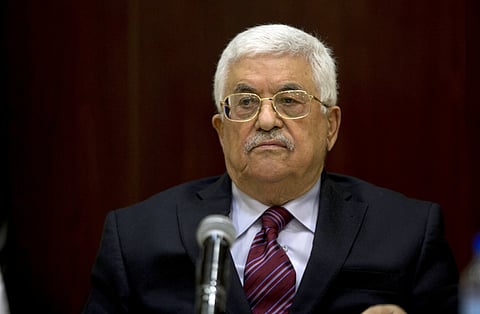Palestinians need democratic representation
Abbas as President has shown more concern about keeping a tight grip on power than seeking liberation for the people he represents

Palestinian National Authority (PNA) President Mahmoud Abbas will, later this month, reportedly resign as the head of the Palestine Liberation Organisation (PLO), though not the PNA, after holding this position for more than a decade. More than half of the members of the PLO governing body, the PLO Executive Committee, will also tender their resignations along with Abbas in a move that his supporters claim will bring in “new faces”. But lest such seemingly positive statements fool anyone, it is important to highlight what Abbas is doing — and what he is not doing.
To be clear, the time has indeed come for new elections. Abbas’s term expired long ago, for he is in his third presidential term — though he was elected for only one term — and the prospect of Palestinian presidential elections are grim. And his is not the only institution whose term has expired. The Palestinian Legislative Council’s term expired more than five years ago and parliamentarians no longer convene to discuss new laws. For more than eight years, the president has appointed the prime minister and cabinet without any legislative oversight or approval. Today, Abbas rules by presidential decree with no ability for lawmakers or the public to intervene. No legislative oversight, no elections and no accountability. And indeed, this is where we, as Palestinians, are headed.
This brings us back to Abbas’s latest move: He is not seeking to bring in “new faces” — for this would be done by broad-based national and international elections — but simply to quash dissent. As Palestinian decision-making becomes increasingly concentrated in the hands of one person, Palestinians are openly questioning Abbas’s legitimacy and, instead of pressing for elections, Abbas has turned to repression. Even members of his corrupt inner circle are now denouncing his one-man rule. Whether by beefing up Palestinian security forces aimed at crushing dissent or imprisoning Palestinians for Facebook posts critical of Abbas and his regime, this president has demonstrated that he is more concerned with ensuring Israel’s security and maintaining a tight grip on power than seeking liberation for the people he represents.
But unlike most autocrats, Abbas is attempting to shroud his autocratic rule by hiding behind historic or once democratic institutions. His resignation will prompt a meeting of the Palestinian National Council — an institution that has not seen elections in nearly 20 years and has not met since 1996 — at which time Abbas will be reinstated as PLO chairman and those who dissent will be summarily removed. And this is the mode by which he operates: He shuffles between the PNA and the PLO, revives old, dead institutions in order to attain “legitimacy” and continues to rule without seeking the approval of anyone – including the very institutions that have given him “legitimacy”. This sleight of hand may fool the international community — for indeed it continues to fund the PNA so long as it provides security to our occupier and oppressor — but the sleight of hand has not fooled Palestinians.
No room for dissent
The legacy Abbas is leaving behind will have lasting repercussions for years to come. With the systematic destruction of every democratic Palestinian institution, there is, today, no room for dissent. Once vibrant institutions are stacked with individuals who fail to hold any sway in Palestinian society. Young Palestinians are unable to join the ranks of political institutions, except by proclaiming undying loyalty to a system that has failed them.
And the future is even more grim. As Abbas continues to tighten his grip on Palestinian society and institutions, the issue of succession becomes even murkier. Where once a Palestinian constitution and elections set forth the means of determining a new PNA president, Abbas’s complete disregard for the constitution will effectively ensure that chaos prevails.
Yes, the time has come for elections — both in Palestine and among the diaspora, which makes up more than two-thirds of the Palestinian population. Such elections should elect a new leadership — one that is representative of the demographics and vision of a newer generation — and not one that will be allowed to be used to grant legitimacy to a dictator under the guise of the “national good”. Palestinians need democratic representation to press for their liberation; not a system that will ensure Palestinian subservience to Israel and its apartheid and colonialism. The time for Abbas’s resignation and real elections is now — before we are saddled with a system that will only serve to further disenfranchise Palestinians and lead to the demise of the Palestinian democratic political system.
Diana Buttu is a Ramallah-based analyst, former adviser to Palestine Liberation Organisation chairman Mahmoud Abbas and policy adviser to Al Shabaka: The Palestinian Policy Network. You can follow her on Twitter at www. twitter.com/@dianabuttu.


